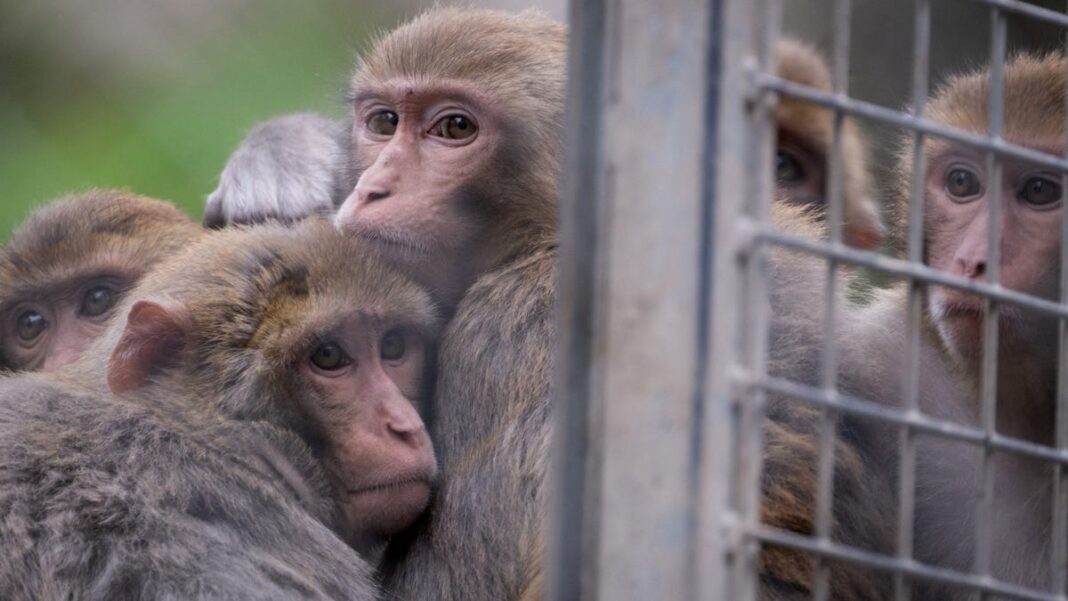Monkeys remain at large in South Carolina as officials race to recapture them
As of Friday morning, authorities reported that forty-three monkeys that escaped in South Carolina were still uncontained, according to the Yemassee Police Department. However, the monkeys have been spotted, and efforts are underway to recapture them.
The young rhesus macaques, specifically female, were said to weigh around 6 to 7 pounds. They escaped from Alpha Genesis, a primate research center located in Yemassee, roughly 26 miles from Beaufort, at about 1 p.m. on Wednesday, as per the 5:50 p.m. report from the Yemassee Police Department on Thursday. The CEO of Alpha Genesis, Greg Westergaard, stated that the escape occurred due to a caretaker failing to properly secure the facility’s doors. While initially thought to be 40, the actual count of escaped monkeys was confirmed to be 43.
Officials noted that these young monkeys had not been used for research testing, and a representative from Alpha Genesis assured that “these animals are too young to carry disease.”
The monkeys are believed to be hiding in the wooded area around the facility. Officers are working with Alpha Genesis staff to lure the monkeys back using food incentives.
Residents urged to take caution and avoid the area
Residents in Yemassee and nearby locations have been “strongly advised” to secure their homes by locking all doors and windows to keep the monkeys out.
Authorities have also instructed the public to “not approach” or interact with any of the escaped monkeys and to call 911 right away if they see one.
The Yemassee Police Department warned that “these animals are highly sensitive and easily startled.” They advised the public to maintain a distance as the monkeys might be skittish, and any excess noise or movement could complicate efforts to capture them safely.
This isn’t the first occurrence of monkeys escaping from the facility. Previously, in 2016, 19 monkeys managed to escape from Alpha Genesis and were captured within six hours. In December 2014, 26 monkeys also escaped.
Alpha Genesis, which conducts various research projects for clients ranging from government bodies to private industries, did not respond immediately to YSL News’s inquiries regarding the incident.
How many monkeys does Alpha Genesis have?
Alpha Genesis houses around 5,000 monkeys across two locations. These monkeys come from Africa, South America, and the Caribbean, including species such as marmosets, cynomolgus monkeys, rhesus macaques, African Greens, and various New World monkeys.
While the recent escape happened at their Beaufort County location on Castle Hall Road, Alpha Genesis also has operations in nearby Hampton County, according to local reports.
What is Alpha Genesis?
According to its website, Alpha Genesis Inc. claims to be the “world’s premier provider of top-quality nonhuman primate products and services.”
The facility emphasizes that its “experienced and compassionate staff” is focused on conducting humane research with nonhuman primates, aiming to enhance understanding of primate biology and address health issues in humans.
In a 2011 interview, Alpha Genesis President and CEO Dr. Greg Westergaard described the facility as “primarily a breeding facility,” where the animals are raised for “research purposes.”
“Our main objective is the health and reproduction of the monkeys,” Westergaard shared during the interview. “We primarily raise monkeys for research purposes, conduct some behavioral studies, and engage in relatively low-impact studies, such as blood draws.”
He also assured that “none of the animals here are infected with any diseases, and the studies pose no risk to the monkeys or the people involved.”
Established in 1964, Alpha Genesis was created to provide monkeys for polio vaccine research, per local reports.
Monkeys bred in Yemassee are sold exclusively to USDA-licensed research institutions, where they are utilized in accordance with legal and ethical guidelines to support vaccine development and address various diseases, including cancer, heart disease, diabetes, multiple sclerosis, and muscular dystrophy.
Westergaard has stated, “While I fully support alternatives to animal research, I see no replacement for them at this moment. However, I back medical innovations that could benefit many people. Our aim is to keep the animals healthy and minimize the number used in research.”
Monkey Island
In March 2023, Alpha Genesis also took on the management responsibilities for South Carolina’s Morgan Island, commonly referred to as “Monkey Island,” which shelters approximately 3,500 rhesus monkeys, as reported by local news sources.
Morgan Island, situated off the coast of Beaufort, spans over 2,000 acres and is restricted to human access, according to Travel and Leisure.
Morgan Island was previously administrated by the South Carolina Department of Natural Resources, while the monkey population was owned by the National Institute of Allergy and Infectious Diseases.

